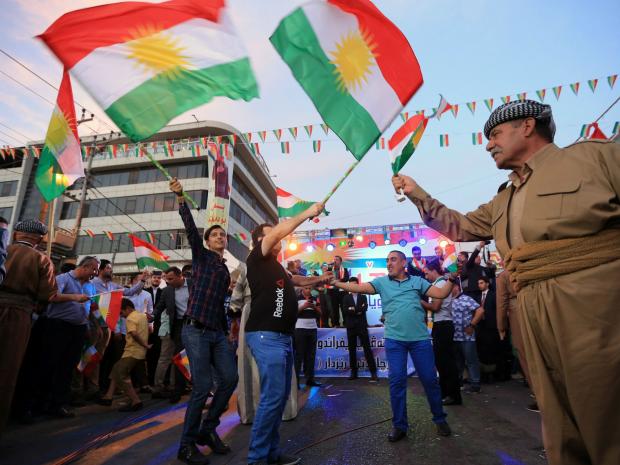Australia/Israel Review
Editorial: The Road to Kurdistan
Oct 3, 2017 | Colin Rubenstein

Colin Rubenstein
Amidst the chaos and turmoil of the volatile Middle East, there is a long-suffering people that have been denied self-determination continuously for almost a century.
Stateless and persecuted, members of this group frequently have every aspect of their daily lives controlled by others. They have been the target of oppression, intimidation and violence. Thousands have been killed. And yet, despite all they have been through, they continue to cling to the hope of a brighter future in a state of their own.
I am not referring to the Palestinians, who have rejected several opportunities to establish their own state and have failed to construct the basic institutions required for one, despite having considerable opportunity to do so.
I am talking about the Kurds, who in northern Iraq have demonstrated that they are more than capable of running a stable, comparatively if imperfectly democratic and pro-Western political entity.
Just before the AIR went to press, three foreign elections were dominating headlines in Australia. Australia’s closest democratic neighbour and ally, New Zealand, went to the polls fresh from re-establishing its diplomatic relations with Israel after Wellington’s highly regrettable and unfortunate co-sponsorship of the one-sided and counter-productive UN Security Council Resolution 2334. The Nationals did not win an outright majority, but seem likely to continue governing with the assistance of the New Zealand First Party.
Meanwhile in Germany, a country vital to the stability of Europe and one of Israel’s staunchest allies, Chancellor Angela Merkel and her Christian Democrats will almost certainly retain power for a fourth term. Yet alarmingly, the far-right Alternative for Germany (AfG) party, the most extreme political group to enter Federal Parliament in Germany since the Nazis, is to become the third-largest bloc in the Bundestag. Given the German historical context, the rise of the AfG is profoundly concerning.
Yet the third vote is potentially the most significant of all. Iraqi Kurds overwhelmingly voted “yes” in a referendum on Sept. 25 on whether to become fully independent from Iraq.
The Kurds were first promised a state by the international community in the 1920 Treaty of Sèvres – but their aspirations for self-determination have been thwarted ever since. They have had limited autonomy in northern Iraq unofficially since the 1990s and officially since 2005 – after they suffered repeated massacres under Saddam Hussein. Iraqi Kurdistan has its own democratically elected regional parliament and president, even though the territory is considered a component of a federal Iraq. The area is a pocket of stability in a region of instability.
Kurdish forces have also made a major contribution to fighting Islamic State and the region has taken in a large number of refugees.
But though Iraqi Kurdistan has every hallmark of an independent state, and a moderate, stable one at that, the road to full independence is still fraught with complications. Despite Kurdish voters overwhelmingly choosing to secede from Iraq, Baghdad will be reticent to even enter into negotiations to start the process.
Kurdish independence also has little support both within the region and beyond. Within the Arab world, Turkey and Iran, the Kurds stand accused of trying to create up to “four new Israels” in the region. Turkish politicians accused Israel this year of being behind the push to establish a new Kurdish state, while an adviser to Iran’s Supreme Leader Ali Khamenei stated in 2016, “the objective behind the establishment of a Kurdish state is the creation of a second and third Israel in the region in order to divide it, which is the goal of imperialism and the Zionists.”
Sadly, the 100-year struggle for independence by a people of 35 million souls with a clearly distinct culture and history has been reduced to a mere Zionist conspiracy.
This is being done, no less, by the very same regimes that continue to champion the Palestinian cause. This clear double standard is exposed as all the more fraudulent by the fact that Iraqi Kurdistan possesses all four prerequisites for statehood under international law – a government, a permanent population, a defined territory, and the capacity to enter into relations with other states – while the Palestinians do not.
It is perhaps unsurprising, then, that there is one nation that is loudly and proudly championing the Kurds’ right to their own independent state – Israel. Prime Minister Binyamin Netanyahu declared his support for Kurdish independence on September 13 after describing the Kurdish people a month earlier as a “brave, pro-Western people who share our values”. Yesh Atid chairman Yair Lapid and Justice Minister Ayelet Shaked have also spoken in favour of Kurdish independence.
There is also a strategic aspect to Israel’s support of Kurdish independence. Israel’s first prime minister David Ben Gurion understood the importance of the Kurds even in the early days of the Jewish state, with his “periphery strategy” of seeking closer ties with them and other non-Arab groups in the Middle East.
Indeed, the objections to establishing Kurdistan reflect the same ugly intolerance and disdain for minority rights that has often wracked the Middle East over the last century – which is also a key to understanding the ongoing and vehement hostility to Israel’s existence. As long as the Middle East was represented as exclusively the property of Arabs and Sunni Muslims, other groups indigenous to the area – Kurds, Jews, Copts, Assyrians, Alawites, Druze, Berbers, Yazidis, Shi’ites and many others – were marginalised at best, and often subject to discrimination and even ethnic cleansing.
The Kurdish referendum won’t see a Kurdish state established tomorrow. It will take time and nothing is guaranteed. Unfortunately, despite the justness of the Kurds’ cause, the Middle East is overwhelmingly an unjust region.
Yet the Middle East currently contains 22 Arab states, one Turkish state, one Persian state, and one Jewish state. Surely justice demands there should also be room for one state to provide self-determination for the Kurds.
Tags: Australasia






